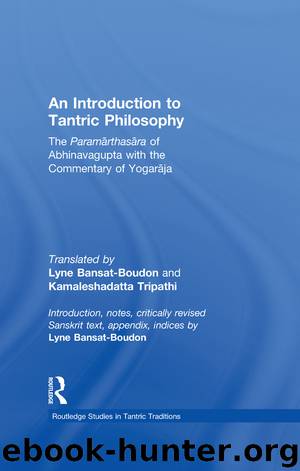An Introduction to Tantric Philosophy by Bansat-Boudon Lyne Tripathi Kamalesha Datta

Author:Bansat-Boudon, Lyne, Tripathi, Kamalesha Datta
Language: eng
Format: epub
ISBN: 9781136930751
Publisher: Taylor and Francis
Appendix
1. Rudra (YR ad 1)
In rudrakṣetrajña, Rudra, or, rather, the Rudras, emblematically represent the category of the adhipatis, presiding deities of the ‘spheres’ (aṇḍa) constituting the universe, which are at the same time levels of subjectivity and experience; on Rudras, see TĀV VIII 306 (so ’vyaktam adhisṣ1E6D;hāya prakaroti jagan niyogataḥ śaṃbhoḥ/ śuddhāśuddhasroto ’dhikār ahetuḥ ṛivo yasmāt //): tacchaktīti tacchabdenānantaparāmarsśaḥ / anena ca na kevalamayaṇ kṣetrajñān āmeva sthitiṃ vidhatteyā;vad rudrān ̣āmapi—ity uktam//, and MVT V 12. Thus Rudra is ‘the one who presides over the condition of pure [limited] subjectivity represented by the Void or by an extremely subtle body formed by the puryaṣṭaka—in other words, over the condition in which there is a reabsorption of every other cognizable reality’ (ĪPvr̥III 2, 1, tr. Torella ĪPK: 197). The deity presiding over a given level of subjectivity and experience brings his devotees to this plane. Therefore, Rudra is also the model for such a subject: he who is able to reabsorb within himself all cognizable reality, he is Pralayākala seen in his divine dimension (on Pralayākala, see YR ad 14 and 23, n. 625, and Appendix 10, p. 330). Responsible for the withdrawal from phenomenal world, Rudra is thus ontologically higher than Brahmā and Viṣṇu, ‘who preside over the manifestation of differentiated cognizable reality, the former causing creation and the latter continuity’ (ĪPvr̥III 2, 1, tr. Torella: 197). In the hierarchy of the cognizers, the line is clearly drawn between Rudra (or the Rudras) and the kṣetrajñas. Rudra(s) as well as Brahmā, Viṣṇu, etc., belong to the category of the Lords (pati), for, as stated by ĪPK III 2, 3, ‘they see things (bhāva) [i.e., the universe (viśv a)] as their own body (svān ̇garūpa) [i.e., as their own Self]’. Thus, they transcend the ordinary dichotomy of subject and object, as do yogins; cf. ŚSV I 14, which comments on dr̥śy aṃśarīr am, ‘[The yogin’s] body is the perceptible’, in almost the same terms:yad yad dr̥śyaṃ […] tat tat sarvaṃ […] svāṃgakalpam asya sphurati na bhedena, ‘Whatever is perceptible, all that […] appears to him […] as his own body [i.e., as his own Self], and not as different from him’. Therefore, the Lords are endowed with ‘sovereignty’ (aiśvarya); see ĪPvr̥III 2, 3. As such, Lords (pati) rule over their subjects, who thus deserve to be called ‘cattle’ (paśu , viz., ‘fettered souls’, according to the traditional etymology — TĀV IX 144b–145a): pāśýatvat̄ paśu r ity ucyate, ‘He is called paśu for he has to be fettered’ (see also YR ad 5) — for not only do they abide by the law of their Lord, but also by the law of difference. The concluding verse of TSIV, p. 32 (quoted by YR ad 33), shows that the paśu is a potential pati and vice versa. It is the supreme pati, Parameśv ara, who opts for servitude, in the free movement of his play. Taking their bodies — as the locus of all worldly experience — to be the Self (or the cognizing subject), instead of consciousness, they are also called kṣetrajña or kṣetravid, lit.
Download
This site does not store any files on its server. We only index and link to content provided by other sites. Please contact the content providers to delete copyright contents if any and email us, we'll remove relevant links or contents immediately.
| Anthropology | Archaeology |
| Philosophy | Politics & Government |
| Social Sciences | Sociology |
| Women's Studies |
The remains of the day by Kazuo Ishiguro(8974)
Tools of Titans by Timothy Ferriss(8365)
Giovanni's Room by James Baldwin(7326)
The Black Swan by Nassim Nicholas Taleb(7106)
Inner Engineering: A Yogi's Guide to Joy by Sadhguru(6785)
The Way of Zen by Alan W. Watts(6600)
Asking the Right Questions: A Guide to Critical Thinking by M. Neil Browne & Stuart M. Keeley(5758)
The Power of Now: A Guide to Spiritual Enlightenment by Eckhart Tolle(5752)
The Six Wives Of Henry VIII (WOMEN IN HISTORY) by Fraser Antonia(5497)
Astrophysics for People in a Hurry by Neil DeGrasse Tyson(5182)
Housekeeping by Marilynne Robinson(4436)
12 Rules for Life by Jordan B. Peterson(4299)
Double Down (Diary of a Wimpy Kid Book 11) by Jeff Kinney(4261)
Ikigai by Héctor García & Francesc Miralles(4246)
The Ethical Slut by Janet W. Hardy(4242)
Skin in the Game by Nassim Nicholas Taleb(4239)
The Art of Happiness by The Dalai Lama(4125)
Skin in the Game: Hidden Asymmetries in Daily Life by Nassim Nicholas Taleb(3989)
Walking by Henry David Thoreau(3953)
